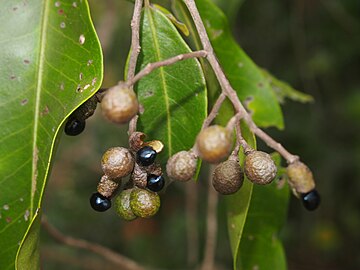Geijera salicifolia
| Glasswood | |
|---|---|

| |
| Scientific classification | |
| Kingdom: | Plantae |
| Clade: | Tracheophytes |
| Clade: | Angiosperms |
| Clade: | Eudicots |
| Clade: | Rosids |
| Order: | Sapindales |
| Family: | Rutaceae |
| Genus: | Geijera |
| Species: | G. salicifolia
|
| Binomial name | |
| Geijera salicifolia | |
| Synonyms[1] | |
| |
Geijera salicifolia, commonly known as glasswood, green satinheart or scrub wilga,[2] is a species of shrub or tree in the family Rutaceae and is native to Australia, New Guinea and New Caledonia. It has narrow elliptic to egg-shaped leaves, small white flowers in loose groups and oval to more or less spherical fruit, each containing a shiny black seed.
Description
[edit]Geijera salicifolia is a shrub or tree that typically grows to a height of 25–35 m (82–115 ft), sometimes with hairs on the branches, flowers and lower surface of the leaves. The leaves are narrow elliptic to egg-shaped, 60–130 mm (2.4–5.1 in) long and 10–50 mm (0.39–1.97 in) wide on a channelled petiole 3–22 mm (0.12–0.87 in) long. The flowers are arranged in loose groups 20–180 mm (0.79–7.09 in) long, the sepals 0.5–1.2 mm (0.020–0.047 in) long and the petals 2–3 mm (0.079–0.118 in) long. Flowering occurs from September to November and the fruit is oval to more or less spherical, 5–6 mm (0.20–0.24 in) long containing a shiny black seed.[2][3][4]
Taxonomy
[edit]Geijera salicifolia was first formally described in 1834 by Heinrich Wilhelm Schott in his book Rutaceae - Fragmenta Botanica.[5]
Distribution and habitat
[edit]Glasswood grows in rainforest, including dry rainforest, and woodland from sea level to an altitude of 880 m (2,890 ft) and occurs in New Guinea, New Caledonia and Australia. In Australia it is found from Coen in Queensland south to the Budderoo National Park in New South Wales and west to the north-east of the Northern Territory.[2][3][6]
Conservation status
[edit]This wilga is classified as of "least concern" under the Queensland Government Nature Conservation Act 1992[7] and the Territory Parks and Wildlife Conservation Act 1976.[6]
Gallery
[edit]-
Fruit
-
Flower detail
-
Foliage and fruit
-
Flowers
References
[edit]- ^ a b "Geijera salicifolia". Australian Plant Census. Retrieved 21 July 2020.
- ^ a b c Thomas G. Hartley (2013). Annette J.G. Wilson (ed.). Flora of Australia (Volume 26). Canberra: Australian Biological Resources Study. p. 79. Retrieved 20 July 2020.
- ^ a b Porteners, Marianne F. "Geijera salicifolia". Royal Botanic Garden Sydney. Retrieved 21 July 2020.
- ^ F.A.Zich; B.P.M.Hyland; T.Whiffen; R.A.Kerrigan (2020). "Geijera salicifolia". Australian Tropical Rainforest Plants Edition 8 (RFK8). Centre for Australian National Biodiversity Research (CANBR), Australian Government. Retrieved 29 June 2021.
- ^ "Geijera salicifolia". APNI. Retrieved 20 July 2020.
- ^ a b "Geijera salicifolia". Northern Territory Government. Retrieved 21 July 2020.
- ^ "Species profile—Geijera salicifolia (brush wilga)". Queensland Government Department of Environment and Science. Retrieved 21 July 2020.




